by Miceál O’Hurley
Diplomatic Editor
Dublin – Wire reports indicate that approximately 10 rockets were fired at a single US military installation within Iraq on Saturday. Speaking hours after the attack, Pentagon Spokesman John Kirby claimed no US military personnel were injured or killed. However, one American contractor is reported to have died from a “cardiac episode” brought on by the attacks.
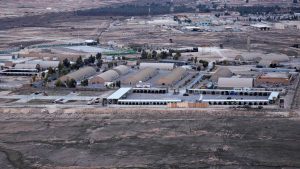
US Asserts Iranian-Made Missiles Were Used|
According to Colonel Wayne Marotta, a US coalition spokesman for the anti-ISIS operations inside of Syria, the rockets are presumed to have been launched by a multiple launch rocket system (MLRS). The HM class “Arash” mobile rocket launcher (produced domestically in Iran based upon the M-21 “Град” (Grad) rocket system engineered by the former Soviet Union), includes the HM-20, HM-23 and HMxx missile systems, all which are known to have been in prior use by pro-Iranian, Shia militias operating in Syria. Multiple media outlets have since reported the launch site was confirmed to have been located just outside the nearby city of al-Baghdadi in Iraq’s Anbar province. The Pentagon has not confirmed this information or clarified if the launch originated on Iraqi or Syrian soil.
Increased Hostility Preceded Today’s Attack

This highly mobile multiple launch rocket system, capable of firing up-to 40 rockets in a matter of seconds, only requires a crew of only 3 persons and takes less than 2-minutes to relocate immediately after firing. Depending on the system variant, the maximum effective range for the missiles is between 20-40km, well enough to give militants inside of Syria the ability to reach US military installations and personnel in Iraq operating with proximity of the Syrian border. Its ability to become immediately mobile after launch makes it a difficult weapons system to target with counter-battery fire and allows it to be camouflaged or relocated and protected before retaliatory airstrikes can be targeted. The Shia militias that have favoured this weapon system have made it a fierce and cost-effective weapons system to use. Both US and anti-ISIS coalition forces in the region have had little success guarding against or preventing such attacks.
This is not the first attack upon the US military installation. Following the assassination of Iranian General Qassem Soleimani in January 2020, Iran retaliated by firing an estimated 22 missiles at the al-Asad airbase west of Baghdad with one missile striking Erbil in northern Iraq. More than 100 US troops were treated for concussions, shrapnel, hearing loss, traumatic brain injuries, PTSD and other injuries owing to those attacks.
Today’s attack comes six days after US President Joe Biden authorised the Pentagon to bomb 9 separate facilities the US claimed were being used by pro-Iranian, Shia militias inside of Syria. Biden justified the strikes based upon what he characterised as “weeks” of rocket attacks targeting US and coalition forces outside of Erbil as well as near the US Embassy in Baghdad. One Filipino contractor and several US military personnel were reportedly injured in those recent attacks.
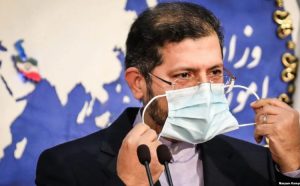
Tehran Grows Increasingly Skeptical of Biden
Iran’s Foreign Ministry has employed increasingly fraught rhetoric over the past month. Speaking in exasperated tones, Foreign Ministry spokesman Saeed Khatibzadeh claimed Biden’s actions in the region, especially with regard to Iran, were “worse” than Trump’s failed ‘Maximum Pressure Campaign.’ Departing from his stated goal of quickly rejoining the JCPOA when he campaigned for President has resulted in Tehran becoming “very suspicious” of Biden, hinting at a “strategic calculation that Biden is not being honest about.” Others have blamed significant Congressional lobbying staged by Emirati, Saudi and Israeli lobbying in Washington that has brought Biden’s under pressure not to alienate his razor-thin majority in the US Senate which could jeopardise his domestic policy agenda.
The sentiment that Biden has shown little if any difference from Trump regarding Iran was echoed by the Washington Institute for Near East Policy’s Fikra Forum contributor Ali Ahmadi, a foreign policy analyst focusing on Iran-US relations. Speaking to diminishing confidence that Biden will reset regional policy as promised during his campaign for the White House, Ahmadi opined, “Up to now, Biden’s security policy regarding the Middle East, as compared to Trump’s policy, has been one more defined by continuity than change.”
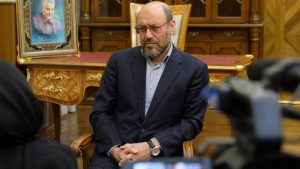
Hossein Dehghan, a military adviser to the Iran’s Supreme Leader, Ayatollah Ali Khamenei, at present Iran’s only declared candidate in this year’s pivotal Presidential elections, joined in the criticism, condemning Biden for simply following Trump’s failed Iran and Middle East policies. Speaking to the Guardian, Dehghan said, “The Biden administration talked about diplomacy, multilateralism and interaction in the international arena as well as returning to its international commitments. However, we still see the same policies from the newly elected administration as we did from the Trump team: not lifting the oppressive sanctions against Iranian people, continuing to block Iran oil revenue in foreign banks while we need the money to fight against the coronavirus pandemic. Altogether this means the continuation of Trumpism in international relations.”
Escalation as ‘Gang of Four’ and Congressional Leaders Notified
As required by US law, Biden sent Congressional leaders a letter following the attacks stating, “I directed this military action to protect and defend our personnel and our partners against these attacks and future such attacks.” If the Biden administration hoped the strikes inside of Syria would have acted as a deterrent to further attacks on US interests in Iraq today’s rocket launches proves them wrong.
The War Powers Resolution requires a President to notify Congress within 48-hours of committing US armed forces to military action. It further forbids armed forces from remaining in theatre for more than 60 days, however, allowing for a further 30-day withdrawal period without the President being required to obtain further Congressional Authorisation for Use of Military Force (AUMF) or a Declaration of War.
Traditionally, the US President has also notified the ‘Gang of Four’ (the Chairmen and Ranking Members of the two Congressional Intelligence Committees), especially if the activity is exclusively intelligence driven. While not statutorily required, the practice has notionally preserved US Congressional bi-partisan cooperation for decades with the stated objective of removing partisan politics from military and intelligence activities.
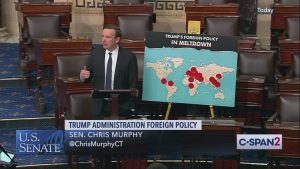
Dubious Legal Standing for Military Action
Surprisingly, Biden appears to be relying on the legal grounding provided for US forces to operate in the region based on Public Law 107–243, the Authorization for Use of Military Force Against Iraq Resolution of 2002. Last year, when then President Trump invoked this same authority to conduct military operations, including conducting the assassination of General Qassem Soleimani, it drew sharp rebuke from Democratic Congressional leaders. Senator Christopher S. Murphy (D-Connecticut), a Member of the Foreign Relations Committee, posted on Twitter, “The question is this — as reports suggest, did America just assassinate, without any congressional authorization, the second most powerful person in Iran, knowingly setting off a potential massive regional war?”
At the time of Soleimani’s murder, then Presidential candidate Biden released a statement calling Trump’s actions “hugely escalatory…. President Trump just tossed a stick of dynamite into a tinderbox, and he owes the American people an explanation of the strategy and plan to keep safe our troops and embassy personnel, our people and our interests, both here at home and abroad, and our partners throughout the region and beyond.” Today, demands for explanations are now being demanded of Biden.
Given that Saddam Hussein and his regime are no longer in power, the predicate basis for the Congressional Resolution from 2002 authorising the use of military force no longer exists. As no sunset provision was provided for in the legislation and Congress has refused to specifically revoke its operative authority, Public Law 107–243 continues to be employed by successive administrations in an attempt to legitimise continued military operations. Given what Democrats called the persistent over-reach of Executive authority during the Trump administration, and now experiencing the same misuse of the Resolution by the Biden administration, Congress may well act now to finally terminate the dubious authority it provided to this point and re-assert its inherent Constitutional prerogative regarding war powers.
It seems remarkable that Biden, who himself was elected to the US Senate in 1972 and served there until 2009 when he was elected Vice President, has failed to anticipate that following in Trump’s footsteps would set the stage for an inevitable power-struggle between himself and Congress. It bodes ill that Biden may well be wasting the ‘honeymoon’ period of his Presidency within his first months in office by continuing to embrace Trump’s failed policy.
Diminished Regional Footprint as US Policy Goal
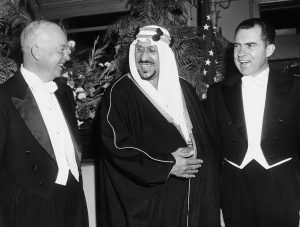
In his 1957 ‘Special Message to Congress‘ US President Dwight Eisenhower inaugurated what became known as the ‘Eisenhower Doctrine,’ a US policy been directed at solidifying relations with regional players in the hopes of achieving regional stability and countering the then growing influence of the Soviet Union. This precarious balancing act was continuously tested by the Arab-Israeli War, conflicts over the status of Jerusalem, containing Russian influence, the continued plight of the Palestinian people, regional competition balancing and other unceasing imbroglios that proved overly demanding of US resources.
After the Iranian Revolution in 1979 US policy morphed into an effort to contain and punish Iran. Inevitably, it created a litany of strange bedfellows which brought the US into disrepute for its support for regional despots like Saddam Hussein and Libya’s Muammar Gaddafi, both known for their brutal treatment of opponents and dismal records of human rights abuses. The US has also endured significant international condemnation for allowing their support for the State of Israel to cause it to abide a record of repugnant human rights violations visited upon the Palestinian people which has in the last month become the subject of an investigation by the Prosecutor of the International Criminal Court.

Over time, the US had become so deeply embroiled in Middle East regional affairs that from the Nixon administration onwards the US has embraced a stated goal of reducing it resource heavy regional commitment all the while continuing its commitment to its partners like the United Arab Emirates, Saudi Arabia and Israel to preserve its vital national interests. Even after two, successive, regional wars and countless proxy confrontations, all while battling the threat and impact of terrorism, the US has only further found itself mired in Middle East politics and consequently being drawn in to tactical commitments that stood in opposition to its stated policy goals.
Testifying before the US Senate Committee on the Armed Services in 2015, Kenneth Pollack, a former CIA Officer, Brookings Institute Policy Analyst and Resident Scholar made the following, poignant statement:

Few assessments of the failure of US policy have been as succinct or clear as the testimony given by Pollack to the US Senate.“The United States continues to have vital interests in the Middle East, and our actions (and inactions) have been an important contribution to its present dismal state. The United States was not wholly culpable for the current situation in the region, but we were also hardly blameless. Many of its problems might have been averted or mitigated by different American policies at various points over the past 30-40 years. Had we wanted to move the region in a better direction, we had many chances to do so. Unfortunately, successive American administrations have prioritized short-term expediency over long-term strategic benefit, and we missed those opportunities time and again.”
Given the growing consensus that the US must achieve its vital goal of diminishing its role in the region without compromising its vital interests, the JCPOA became the very tool which offered the US an exit strategy that provided a basis for regional threat reduction while maintaining a commitment to regional partners and stability. Despite being unable to get the ideal agreement he wanted, Biden’s calculus none-the-less indicated the JCPOA would provide that singular opportunity necessary to achieving the overarching policy goal the US had proclaimed for decades – seeing the Middle East reach organic diplomatic maturity.
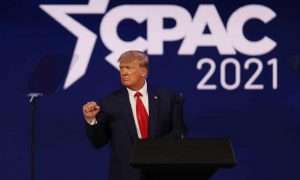
P5+1 Skepticism Restrains Progress
Trump’s bombastic sense of unilateralism took a heavy-toll on US-European relations. Last weekend’s Conservative Political Action Committee (CPAC) Conference, where the now twice-impeached and disgraced Donald Trump re-asserted his control over America’s conservative movement, and to which the Republican Party was happily pliant in its acquiescence only served to maintain the threat that he, or a like-minded minion, might return to the White House and create a self-actualising arc of policy swings which will continue to alienate, frustrate and defeat multilateral commitments to any US policy, especially the JCPOA.
It is incumbent upon Biden and Congressional leaders to rebuild credibility with historic US partners in Europe and beyond. Nowhere is this more pressing than with the P5+1 signatories to the JCPOA who laboured hard and long to achieve a workable deal only to see it blown-up by Trump with the exercise of a single signature. Unless domestic political discourse returns to mature actors from both US Republicans and Democrats who understand the paradigm of cause and effect in foreign policy and international relations the the P5+1 commitment to a robust embrace of the JCPOA, or a return to doing business with Iran, may be lackluster for fear that the durability of the US commitment may be short-lived.
As only one sign of diminished US influence in Europe, despite President-Elect Biden imploring Europe to wait to sign a trade agreement with China before he took office, Europe ignored his request and proceeded in December 2020. Europe, badly shaken by the abuse they received at Trump’s hand, now see China as not only their largest trading partner, but increasingly a critical player in world diplomacy, all to the chagrin of the Biden administration. While welcome, Biden’s announcement of further financial commitments to NATO and the COVAX global health and security programme has not restored US standing in Europe.
US Regional Partners Confound US Policy Goal Attainment
Uneven US policy has been at the heart of the lack of equilibrium amongst the key regional players. Consequently, Iran, very much like its Emirati, Saudi, Israeli and Turkish regional neighbours, has abundantly demonstrated its ability to act as a destabilising agent in the region and it must bare responsibility for the same. Uniquely, however, it is Iran alone that is continually singled-out by successive US administrations for sanctions and coercive policies while the sins and aggressions of its neighbours pass without comment, doing little if nothing to halt the massive weapons sales that only add to the regions woes.
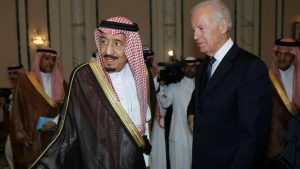
As this past week clearly demonstrated this axiomatic reality. Even with the Biden administration publishing a public report indicating that Saudi Crown Prince Mohammed bin Salman specifically ordered the outrageous and brutal murder of dissident Saudi journalist Jamal Ahmad Khashoggi it has failed to move President Biden to enact the very sanctions against bin Salman that Candidate Biden promised. Here again, Biden seems to be following in Trump’s muddied footsteps and in so doing only exacerbates the difficulties he faces.
Despite decades of the US embrace of the Emirati, Saudi, Israeli triumvirate in the hopes of sidelining Iran, such efforts have failed. Biden has to date appeared unlikely to change US policy or even hold his Middle East partners responsible for the most horrific of acts that are antithetical to US claims on human rights, democracy and free speech. Biden is beginning to appear weak, vacillating and from his unwillingness to pay the political price to rejoin the JCPOA to his lackluster support for increasing the pathetically low minimum wage Biden seems incapable of keeping his word and delivering on key promises at home and abroad. All this only provides more fodder for US international partners to observe that the seat of world power has already shifted with German Chancellor Angela Merkel, an ardent devoté of multilateralism, having become the acknowledged ‘Leader of the Free World’ over the past four years. With each misstep, and failure to restart the JCPOA, Biden seems bent on incuring self-inflicted wounds that diminishes his stature, and along with it a return of the stature the US formerly held in the international community.
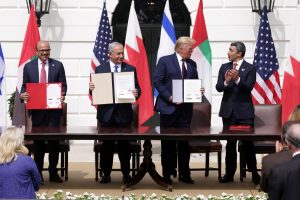
Sober analysis would conclude that the Emirati, Saudi, Israeli triumvirate that has coalesced over the past two years has been driven in large-part, but not solely, by a deep seeded desire to isolate Iran. But this has not been its only goal. Contrary to US interests, the triumvirate is intent on keeping the US fixed in the region and continuing to use their leverage for their own purposes. The triumvirate has the unabashed and overt goal of plying intense pressure on the US to remain disproportionately active in the region despite its policy objective to lessen its presence in the Middle East.
Biden now is confronted with maintaining US regional interests, stability and relations while still effectively extracting itself from regional dominance. Seemingly, Biden has already begun to bow to the pressure brought on by historic US regional partners who stand opposed to US strategic goals. The brazenness of this effort is more all the more demonstrable when Israel at times has gone to the extent of taking unilateral military actions against Iran that at times conflicts with US diplomatic initiatives to restrain Iran’s uranium enrichment programme. The result is one that almost coerces the US into choosing between Israel and the JCPOA – the key to its regional extraction – confounding stated US strategic regional policy goals.
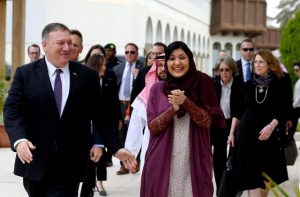
In Washington, the new Saudi Ambassador, Princess Reema bint Bandar Al Saud (the daughter of Washington insider and former Saudi Ambassador Prince Bandar whom President George W. Bush called ‘Bandar Bush’) has begun a charm offensive to keep Washington’s power brokers in line. To be sure, there is no hint that the Princess relies on a hacknied idea of employing ‘feminine charm.’ Princess Reema has earned her reputation as an incredibly intelligent, capable, well educated and politically savvy diplomat. Her intimate personal ties to US Presidents and Congressional leaders date back to her childhood. Biden’s failure to raise the issue of Crown Prince Mohammed bin Salman’s personal role in the murder of Khashoggi when he spoke by telephone with Saudi King Salman speaks volumes about her deft diplomatic skills as much as it does about Saudi Arabia’s continued influence on US policy in the region.
Israeli Prime Minister Benjamin Netanyahu, buoyed by recently concluding pacts to strengthen diplomatic ties and regional cooperation with Saudi Arabia, Bahrain and the United Arab Emirates, known as the ‘Abraham Accords‘, has taken an equally aggressive influence campaign with US policy makers and politicians. Israel has been quite vocal about their discontent with the JCPOA, with Netanyahu commenting in the run-up to the US Presidential election, “There must be no return to the previous nuclear agreement. We must stick to an uncompromising policy to ensure that Iran does not develop nuclear weapons.”
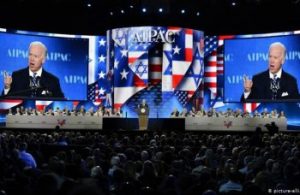
Contrary to evidence and verification by the International Atomic Energy Agency (IAEA) that Iran was abiding by the JCPOA which would deter any attempt to attain nuclear weapons capacity, Israel’s efficacious pro-Israel US lobby, the American Israel Public Affairs Committee (AIPAC) has been vociferous in their condemnation of President Obama’s decision to negotiate the JCPOA and Biden’s stated but unrealised goal of re-joining the deal. AIPAC, which reportedly budgeted upwards of $20m in their campaign to defeat the JCPOA, and smarting from that loss, have been reported by Members of Congress to have returned to a vigourous lobbying effort to see the Biden administration does not rejoin the JCPOA and in so doing resurrect their waning influence which suffered greatly after the JCPOA was signed in 2015.
Netanyahu, like his former governing coalition partner Benny Gantz, the Knesset and their AIPAC allies in the US all maintain their belief that until the Islamic Republic of Iran falls they will not be safe from an Iranian nuclear attack. With a deep distrust of Tehran (a sentiment that is reciprocated), Israel believes diplomacy with Iran to be futile. Therefore, Israel continues to believe the use of force, military and otherwise, employed against Iran is their only sure deterrent. Continued US oppression of Iran through military application and continued sanctions is, by Israel’s reasoning, required.
Tactical Necessity Versus Strategic Goals
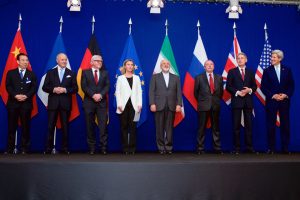
In 2015 the P5+1 and the US disagreed with Israel, the Emirates and Saudia Arabia, believing the JCPOA is a critical platform upon which to further build regional peace and security and made the deal. In 2020, Candidate Biden still believed this to be true and announced that if elected he would see the US rejoin the JCPOA from with Trump withdrew. In 2021, however, President Biden has deferred rejoining the JCPOA, engaged in a no-win battle of wills Iran over who must move first and now has allowed himself to be drawn into regional attacks which endanger chances for cooperation all while continuing Trump’s policies.
Biden now faces the operational imperative of addressing the tactical demand to protect and defend US troops, installations and interests in the region. This almost dictated Biden’s decision to order last week’s retaliatory strikes on pro-Iran, Shia militias that had been attacking US interests. And here is the conundrum – the very act of servicing tactical necessities frustrates the US goal of rejoining the JCPOA – and therefore achieving the policy goals which made it necessary.
As long as Biden calculates that he will have to pay too large of a domestic political price for rejoining the JCPOA and continues to become enmeshed in low intensity regional conflict with pro-Iranian, Shia militias the less likely it is that the US will be able to extricate itself from the region and shirk-off the shackles of past relationships through the organic development of regional powers.
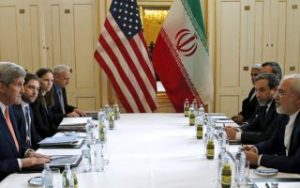
President Barrack Obama acutely understood this dynamic and therefore made the JCPOA (برنامه جامع اقدام مشترک) the foundational lynchpin to US policy goal attainment. His then Vice President, Joe Biden, understood the importance of the JCPOA to US strategic interests, yet now he seems to be willing to imperil long-term US strategic goals by being dragged into short-term tactical conflicts. Failing to immediately rejoin the JCPOA, as he announced was his goal, has proven a mistake. Continuing Trump’s policy of staying aloof from the JCPOA has not moved Iran. Nor has Biden’s failure to rejoin the JCPOA made the P5+1 signatories to the deal happy. Worse still, it continues to undermine what shreds of confidence the P5+1 previously had for the US after years of being subjected to the reckless and unpredictable unilateralism of Trump’s ‘America First’ doctrine.
Equally disturbing is Iran’s refusal to reign in its proxy allies and take the pressure off Biden to act decisively to rejoining the JCPOA. There is no merit in decrying false victimhood when there are abundant and legitimate complaints Iran can state. Tehran is keenly aware of the intense regional and domestic pressures on Biden and Congress to further subdue Iran if not obtain concessions on ballistic missiles and other matters before it rejoins the JCPOA. Such concessions are unrealistic while the US remains aloof from the JCPOA. Iran risks creating such a hostile environment for Biden to see the US return to the JCPOA that a misstep might well dissipate chances for the deal to be reinvigourated soon, an act which is as fundamentally critical to Iran’s interests as it is to the US.
Missed Opportunity
During the run-up to last year’s Presidential election, then candidate Joe Biden sought to distinguish himself from his opponent, incumbent President Donald Trump, by citing his unswerving goal of returning the US to multilateralism. Specifically, this meant having the US rejoin the JCPOA. Surprisingly, Biden has not seized on the opportunity to do so and he risks losing the opportunity to do so without paying a higher cost. Biden and his gifted Secretary of State Anthony Blinken, and his National Security Advisor colleague Jake Sullivan seem to have forgotten the fundamental principle of negotiations – if the best alternative to a negotiated agreement is less appealing than the negotiated agreement – commit to the negotiated agreement.

It is within Biden’s gift to rejoin the JCPOA with the same ease and fanfare as he received upon rejoining the Paris Climate Accord. The only difference is his willingness to put his political capital on the line to endure the barrage of criticism he will receive at home. Biden’s posture in demanding that Iran return to adherence to the JCPOA of which the US is no longer a party is a seriously misplaced demonstration of misguided “machismo.” Few world leaders or analysts understand Biden’s hesitancy to recommit the US to the JCPOA and have begun to question his optics and commitment.
Given the IAEA confirmation that Iran was abiding by the JCPOA (something they continued to do for more-than-a-year after Trump unilaterally withdrew the US and imposed secondary sanctions on anyone who did business with Iran, including the other JCPOA signatories), Biden, Blinken and Sullivan that have somehow convinced themselves (and almost exclusively themselves) that it is Iran that bares the burden of responsibility in returning to the JCPOA enrichment restrictions before the US will rejoin the deal. As the deal crumbled because of the US withdraw, this demand reeks of a misplaced sense of power and influence more accustomed to the archaic arrogance of empires now dead.
Decades of Miscalculation
Iran has shown both remarkable discipline and patience in their attempt to keep the painstakingly achieved JCPOA alive. They have done so even at the risk of alienating domestic hardliners during an important election year. Indeed, after almost 40-years of sanctions, the Islamic Republic of Iran has not only proved its staying-power, but has managed to keep at least a limited measure of political pluralism alive, albeit the breadth of that diversity diminishes year-by-year. It would be a mistake for Biden to mistake this practical stance as weakness on the part of Iran.
In contrast to Iran’s empowerment derived from surviving the awesome coercive powers of the US for over 40-years, with each year that passes, US policy has come under increased scrutiny, not only from its international partners but the American people themselves. The American people have been conditioned to be weary of Iranians and formed to view them as the very reason for Middle Easter insecurity. It is time for US policy makers to challenge this view and embrace a more nuanced understanding of the Iranian-US dynamic.
Without a doubt, there is a desire by certain interests in the US to keep the trauma of the 1979 Revolution and American Hostage Crisis operative in the American psyche. That the American people have heretofore adopted this view strikes some as odd as the American people are often accused of having a short attention span and even shorter collective memory. However, the animus it generates has sustained crushing sanctions for decades, despite achieving any specific result and inflicting an almost inhuman effect on the general Iranian population. Somewhere along the line, the American objective of avoiding war by pursuing sanctions (a time honoured diplomatic tool, albeit one with a dismal track record of effecting change) gave way to a neo-conservative belief in the US that sanctions would bring about regime change. It has not.

The US has also proved itself unwise in forcing Iran to abandon the tools of State and Statecraft and embrace a dangerous dance with proxy partners carrying out asymmetrical aggression throughout the region. This is no mere adaptation to Iran using cost-effective tools like the MX missiles it produces to extract a heavy toll on the US and its coalition partners or employing cyber espionage to inflict low-cost, high-impact damage to its enemies. The longer US sanctions endure and regional policies challenge Iran’s ability to act as an equal agent in the world the more ingenious Iran will become in extracting their own toll on the US and its allies. Time has borne this out. This very dynamic creates incredible obstacles to combat and only serves to propel Iran away from acting with the full capacity of a State and making it more like the pariah the US fears most. In this, the US has created the very golem that becomes the agent of its own destruction.
There is little doubt that Iran is capable itself of being a combative, difficult and destabilising player amongst equally combative States. However, unlike several of its neighbours, there is no recent history of Iran invading a neighbour. True, Iran regularly supports proxy-players who take on military actions in-line with Tehran’s policies and objectives (if not specially authorised, financed and directed by them). However, a critical review of the region will reveal that Iran’s neighbours have aggressive histories of invading their neighbours, training, supporting and engendering terrorists, using chemical weapons, spying, sabotage and more. The question then becomes why single-out Iran?
It is difficult to admit as an American, but for decades our policies towards Iran have been largely driven by an enduring hatred of the players and events of the 1979 Revolution and the American Hostage Crisis. US Policy has also been driven by the admittedly mistaken belief that the US must play an oversized role in Middle Eastern affairs because of a lack of diplomatic maturity. Endless regional conflicts, the enduring shame of the Palestinian people almost being willfully remanded to a State of permanent occupation, the US role in the longest wars in its history marked by brutality, death, destruction, human rights violations, all without achieving any specific strategic goals, has proven the folly of US regional policy and yes, even its policy towards Iran.
Iran’s Failure to Develop Nuclear Weapons is Not for Reasons Presumed
In a region where neighbours have continually demonstrated their unceasing willingness and ability to disrupt peace and stability, often contrary to their own interests, the JCPOA was an incredible achievement. The stated goal of keeping the Iran from becoming a nuclear power is laudable. But context is important.
History will show that the US achieved nuclear weapon attainment in under 3-years, making it the world’s first nuclear nation. The Soviet Union soon followed with their own rapidly developed of a nuclear weapon. A chorus of nations followed until the world saw the benefit and necessity of producing the Non Proliferation Treaty (NPT).
The NPT has, against all odds, proved remarkably effective. Of the 195 States around the globe only 9 maintain nuclear weapons – the US, UK, Russia, France, China, India, Pakistan, Israel and North Korea. There is one lesson from this list that seems to have yet been learned and it is instructive.
North Korea proved that even the poorest of nations, suffering under the heavy burden of exacting international sanctions, is capable of marshalling the scientific know-how, materials and will to produce nuclear weapons. Pakistan demonstrated that it only takes less than 9 years from concept to deployment to achieve nuclear weapons capacity.
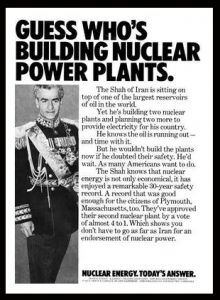
It is therefore necessary to ask why Iran, whose nuclear weapons programme began under Mohammad Reza Pahlavi, the last Shah of Iran, in the 1950s under the under the euphemistically entitled US ‘Atoms for Peace’ programme, and has continued to this day, has yet to achieve nuclear weapons status. With over 60-years of nuclear development activity, almost 30-years of which were gained with US technology, financial and expertise assistance, and with decades more since the Revolution established the Islamic Republic of Iran, the State has still not developed a nuclear weapon. Not one.
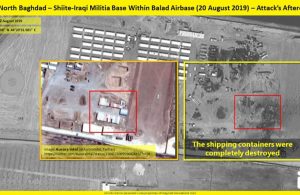
Critics will claim Iran was only prohibited from achieving that goal because of military, intelligence and other intercessions. Such a claim is naïve and misplaced. Iran has the inherent technological capability for nuclear fuel cycle and the resources to development them to weaponisation. Moreover, its political structure would make implementing a decision to attain nuclear weapons easy to implement. So, deterrence alone does not adequately explain this phenomena any more convincingly than does Ayatollah Khamenei’s claim that “nuclear weapons are forbidden under Islamic law. ”
There can be little question that Iran’s scientists are as capable as those in other nations. Indeed, the assassination of Iran’s leading nuclear scientist, Mohsen Fakhrizadeh, on the streets of Tehran last year by those who opposed the JCPOA gives voice that Iran’s scientists are deemed highly capable of delivering nuclear weapons. So, the lack of nuclear weapons cannot be any lack of scientific prowess. Nor can the issue be sanctions, as North Korea has proved. So, if expertise and sanctions are not the reason, and with Iran demonstrating it has the capacity to enrich uranium, the reason Iran is not a nuclear weapons capable nation must therefore fundamentally lie in its own self-determination. It is time for the US to re-consider this point.
Iran Has Properly Calculated the Threat of a Nuclear Robust Region
Iran, fully aware they are geographically situated in a historically conflict-driven region, where their Shiite nation remains an outlier in a sea of Sunni nations, their survival must be carefully managed. The Middle East’s history is one of almost incessant tribal rivalry throttled the region with interlopers asserting dominance in the vacuum thus keeping the region from achieving its full potential.
Considering this, it is not surprising that Iran decided long ago it may not want to become a nuclear State. This is not because nuclear weapons would not imbue Iran with elevated threat capacity and the attendant power that attaches thereto. It is because nuclear proliferation always creates the spread of exponential lateral dangers. Surprising as this may be, Iran’s deciding not to become a nuclear power not only appeals to reason but may have been instrumental in maintaining the State, albeit not alone for the religious reasons espoused by Modongal Shameer and Seyed Hossein Mousavian in their evocative and excellent paper, Why Iran Has Not Developed Nuclear Weapons (Bandung, Journal of the Global South – 2019).
US Needs the JCPOA – But Will Biden Pay the Domestic Price Required?
The JCPOA was the US passport out of the region. By reducing regional tensions and threat the JCPOA would releasd free its regional partners from decades of US infantalisation that produced poor results and restrained the natural development of nations. For the US to exit its dominant role in the region without compromising its vital national interests regional player would necessarily be forced to stop relying on the US to constantly intercede and begin to stand on their own without the heavy-hand, financial commitment and large military deployment of the US.
Obama, and presumably then Vice President Biden, understood the JCPOA would allow the US to re-calibrate its relationship with the Emirati, Saudi, Israeli triumvirate and even Iran itself. The JCPOA was that functional tool necessary for the US to cease acting the regional ‘policeman of the world’ that has brought about so much of its difficulties, both domestically and internationally. In short, it was an instrument that announced America’s maturation as an equal partner in the sorority of nations cognisant that it could meet its own self-interest with a durable embrace of multilateralism. Of course, nobody could have realistically predicted the rise of Trump’s severe unilateralism or the extent US regional partners would feel threatened by the move.
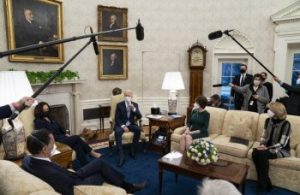
Biden’s failure to seize the day and rejoin the JCPOA, as a basis for asserting robust inspections and having a basis to demand compliance has been a missed opportunity. Now, the tactical necessity of retaliating to attacks, which have only brought about further attacks and reprisals, leaving the deal teetering on the verge of intractable resolution. The window of opportunity for the US to rejoin the JCPOA with the predicate of congeniality required to make it work with Iran as a partner is closing.
Because of the historic crafting of Iran as a member of what President Bush called the ‘Axis of Evil,’ any warming to relations with Iran, no matter how practical or necessary, will incur a political price domestically. Republicans, who have sustained their support for Trump despite his support for an attempted coup d’état to keep him in office after losing the 2020 Presidential election, would undoubtedly make Biden pay a high-price for reinstating the JCPOA which Trump effectively killed. Still, it is in the US vital interest to contain the threat of Iran reaching nuclear weapon containment without the use of regional force which could further inflame the region. And, without the JCPOA, and continuing to suffer both primary and secondary sanctions from the US, Iran has little incentive not to continue to pursue nuclear weapons attainment, despite previously calculating that such an act would undoubtedly set-up a regional nuclear arms race.
The US is leaving Iran few options and remaining aloof of the JCPOA is not only contrary to US interests, but is causing all parties to harden their bargaining positions. A time will come soon when the will or desire to rejoin the JCPOA by any party is outstripped by domestic tensions or one of the low-intensity conflicts that rage in the region, from Yemen to Syria, consumes whatever good will is left in diplomatic circles.
Should Biden forfeit this opportunity it will only serve to restrain US efforts to address other issues of concern with Iran including ballistic missiles, human rights, state sponsored terrorism and the host of other issues pregnant with the possibility of erupting at any time. Biden will never achieve his announced goals of reducing the US commitment to the region without a functional JCPOA with robust inspections, verifiable compliance and the abandonment of the failed, decades old sanctions regime.
Immorality of Unending Sanctions
Sanctions may be the last, best act short of war, but they have proven abjectly worthless in effecting regime change. Be it Cuba, Zimbabwe, North Korea, Iran or Venezuela, sanctions have had the opposite effect and emboldened regimes long past their ‘sell by’ dates. While sanctions did have an effect in bringing down the apartheid regime in South Africa, no scholar or statesperson would argue they were the specific reason for the regime’s demise.

As of today, the US maintains more than 8,000 separate sanctions. These include the gambit from countries to companies to individuals. in place against individuals, companies and countries. Given his mistaken belief that sanctions bring about regime change, Trump introduced more than twice as many sanctions per year as did his predecessors Bush or Obama, implementing more than 700 sanctions in a single day against Iran after withdrawing from the JCPOA. US employment of sanctions has risen to the level that the UN High Commissioner for Human Rights warned the US that contrary to achieving policy objectives its robust sanctions policies threatened the lives of millions of ordinary people around the globe.
Speaking on CNN’s GPS in February 2021, journalist, commentator and former editor of the New Republic, Peter Beinart, gave the following view of US sanctions policy:
“I was particularly focused on what are called secondary sanctions where the U.S. not only refuses to trade itself but essentially tries to prevent other countries from trading. I described that as a kind of a siege. Oftentimes these are terrible governments that we are imposing these sieges on. But the academic evidence is clear. When you impose a siege and virtually make it very difficult for even humanitarian goods to come into a place like Venezuela or Iran and North Korea, you don’t harm the regimes.
You actually harm the already brutalized people. And I think the Biden administration needs to completely review this policy, to become a cheap way for America to try to suggest its moral superiority and it actually hurts vulnerable people.”
At present, more than 50% of the world’s populations live under either direct or secondary sanctions. It is time for the Biden, Blinken and Sullivan to re-evaluate not only the effectiveness of the decades old US sanction regime, but the very morality of sustaining such an inhumane practice. Because of secondary sanctions, few countries or people in the world are willing to risk doing business with Iran such that ‘in-practice’ US sanction deprives the average Iranian from basic health care, nutrition and other fundamental human needs. The US has become the author of the very humanitarian suffering of which it complains other nations are responsible.
It was 200 years ago this year that President John Quincy Adams, one of America’s most learned and accomplished diplomats, proclaimed:

“[America] goes not abroad, in search of monsters to destroy. She is the well-wisher to the freedom and independence of all. She is the champion and vindicator only of her own. She will commend the general cause by the countenance of her voice, and the benignant sympathy of her example. She well knows that by once enlisting under other banners than her own, were they even the banners of foreign independence, she would involve herself beyond the power of extrication, in all the wars of interest and intrigue, of individual avarice, envy, and ambition, which assume the colors and usurp the standard of freedom. The fundamental maxims of her policy would insensibly change from liberty to force…. She might become the dictatress of the world. She would be no longer the ruler of her own spirit….”
Adams understood that not only would America become a great power, but that if she were to remain a wise and good nation, she would be ever cognisant of her own limitations, and the necessity of self-limiting the exercise of her powers. A nation that grew to greatness by understanding when and when not to flex its muscles on the international stage somewhere forget there are times it should not. Failing to heed Adams’ guidance has tended to diminish the US over the three quarters of a century, the Middle East being only one example.
It is time for the US to re-embrace Adams’ world view. The Emirati, Saudi, Israeli triumvirate should not continue to cloud US judgment. The US may be loath to admit it, but it needs Iran as a partner in the JCPOA so as to be empowered to act in her own national interest as expressed by successive administrations – reducing her regional commitment in the Middle East.
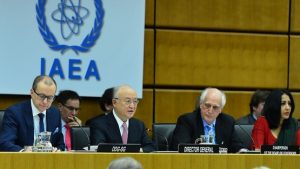
Good Will Required by All
Iran is not blameless in this debacle. The decision to enrich uranium at levels above the JCPOA restrictions and statutorily restrict IAEA inspections has proven an unnecessary gamble and one without a foreseeable pay-off. Despite the incremental danger posed by higher enrichment over time this policy has not brought the US to the table. Moreover, the continued aggression by pro-Iranian, Shia militia which produces has only resulted in a vicious cycle of attacks and reprisals that exhausts everyone’s patience and diminishes good will. Worse still, it leaves Biden boxed-in by those who desire to continue the failed US policies of the past such that the political price Biden must pay domestically rises daily.
All the while this debacle has only served to further embolden and strengthen the position of the anti-JCPOA Emirati, Saudi, Israeli triumvirate who have proven themselves not only willing to challenge Biden in the halls of Congress but engage in further covert activity and overt strikes on Iran’s nuclear sites. Still, Biden has not seen fit to resolve the matter and rejoin the JCPOA.
The fault is not Biden’s alone. Iran loses nothing by returning to the enrichment levels it agreed to in the JCPOA except the fear of being seen as weak. It is not. If its nuclear programme is not offensive in nature, as Iran has claimed, enrichment at the higher level serves no legitimate purpose except to increase tensions and danger. Restricting IAEA inspections only serves to heighten tensions and drive misplaced fears. Iran’s decision to enrich uranium at higher levels has proven an ineffective bargaining tool and should be abandoned. If halting enhanced enrichment, even for 30-days, did not finally shame the US into rejoining the JCPOA then efforts to restart it should be abandoned as the P5+1 and world community would then resolve that the US was disingenuous about making the JCPOA work and was only interested in using the deal as a battering ram against Iran.
As Iran approaches nuclear weapons capability it runs the real risk of its neighbours deciding to become nuclear States. Bahrain, despite advocating for a nuclear weapons free Middle East, might be pushed to consider creating a nuclear arsenal if it’s national interests were at threat. If another regional player, one even as small as Bahrain, which has the financial resources and structural political leadership capable of achieving nuclear weapons status, were to pursue such a policy it would set in motion a cascade a regional nuclear arms race which is in no one’s interest, especially Iran’s.
Iran’s enhanced enrichment production risks it being engulfed in its own event horizon such that it may have no choice but to finally achieve nuclear weapons capability. At that point Iran would be compelled to attain nuclear weapons capability. Historically, Iran has been astute enough to understand this. This, for more than any other reason, explains why Iran has not pursued the actual attainment of nuclear weapons capability, instead using its pursuit in an attempt to correct regional power imbalances largely fueled by US policy.
US Must Act Now
It is within Biden’s gift to rejoin the JCPOA tomorrow. This act would not only see Iran quickly return to agreed JCPOA enrichment restrictions and a robust inspection regime but would greatly reduce regional tensions. Only when Iran feels it does not need to flirt with nuclear weapons attainment, Israel feels secure and other regional partners no longer feel driven by historic events and unreasoned fears can a modicum of peace be achieved. Then, and only then will the US no longer feel obliged to be the regional power-broker that holds the region together, even if it does so badly.















































